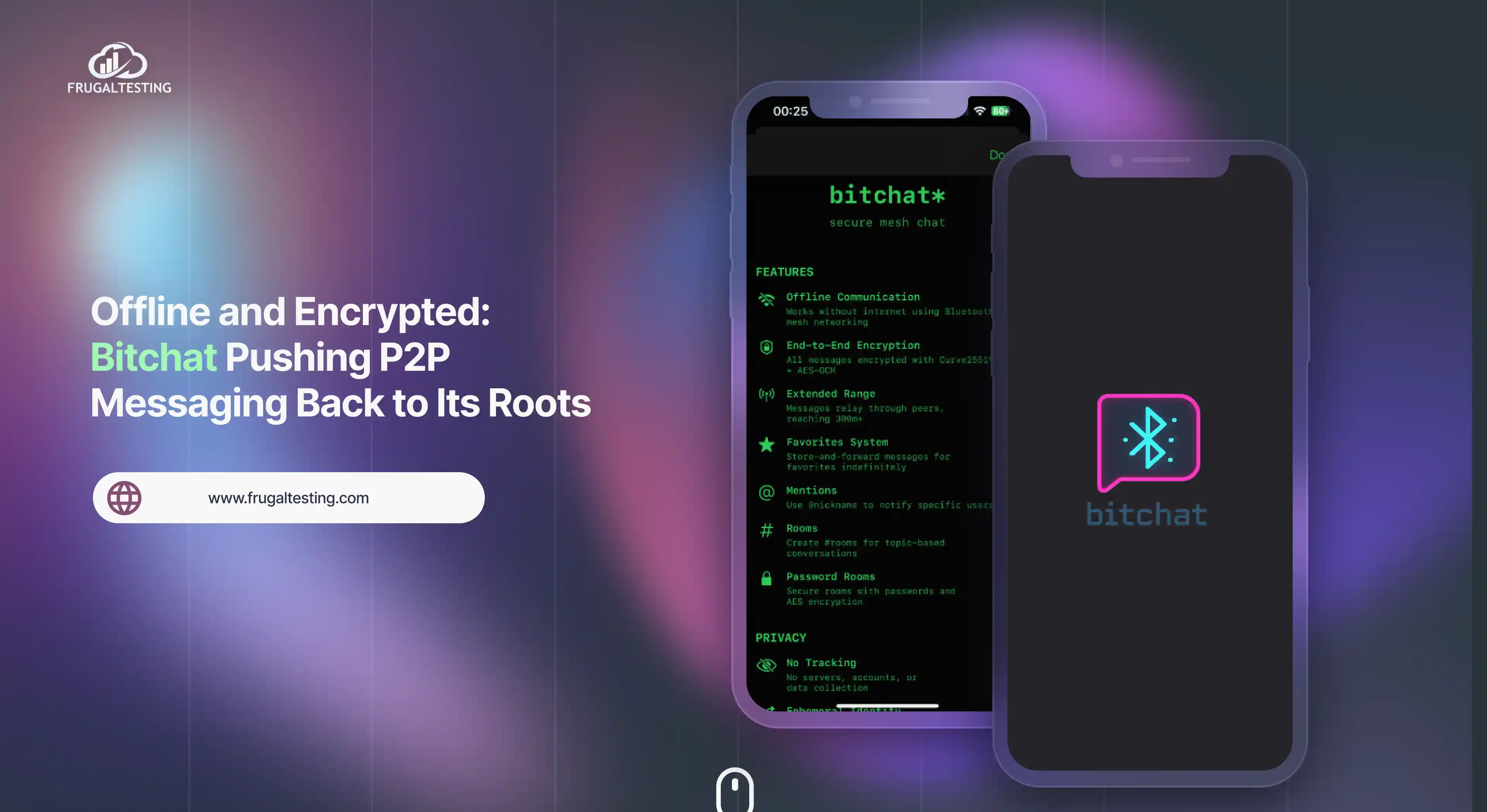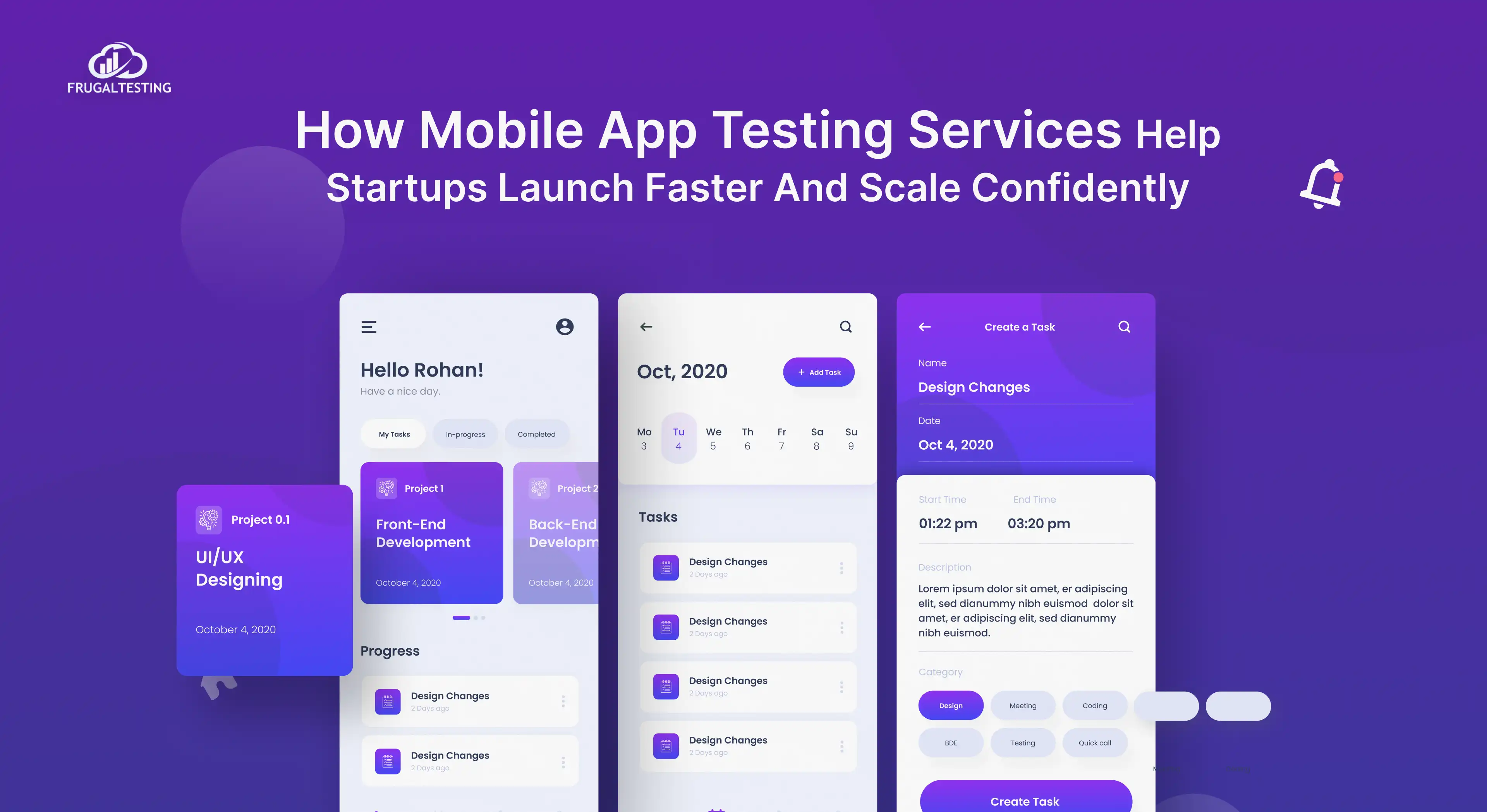As mobile app development 🌐 continues to grow, automated testing plays a critical role in ensuring that applications meet the highest standards of quality. As the complexity of mobile apps increases, traditional testing methods are no longer sufficient. This is where AI-powered automation 🧠 comes into play, revolutionizing the way we approach mobile testing.
Appium 🛠️, a widely used mobile automation framework, has become a game-changer for testers by allowing them to run tests across multiple mobile platforms (iOS, Android) seamlessly. When combined with AI 🤖, Appium can deliver even more powerful results by intelligently enhancing test processes, identifying patterns, and automating decision-making in real time.
In this blog, we will explore the powerful combination of AI and Appium, discussing how AI is transforming mobile test automation, making it smarter, faster, and more efficient 🚀.
By the end of this Blog, you'll discover 🔍
- Introduction to mobile test automation and its significance in modern app development.
- The role of Appium in automating mobile tests across both iOS and Android platforms.
- The importance of integrating AI with Appium to boost testing capabilities.
- Practical use cases of AI-powered Appium automation in real-world scenarios.
- Best practices and future trends in AI and Appium for mobile test automation, focusing on effective AI integration and how upcoming innovations will transform testing.
Introduction to Mobile Test Automation
Mobile test automation is essential for fast and reliable testing of mobile apps across devices. It helps automate repetitive tasks, ensuring that apps perform well, are secure, and meet user expectations. Tools like Appium are widely used for mobile app testing, enabling faster execution of tests.
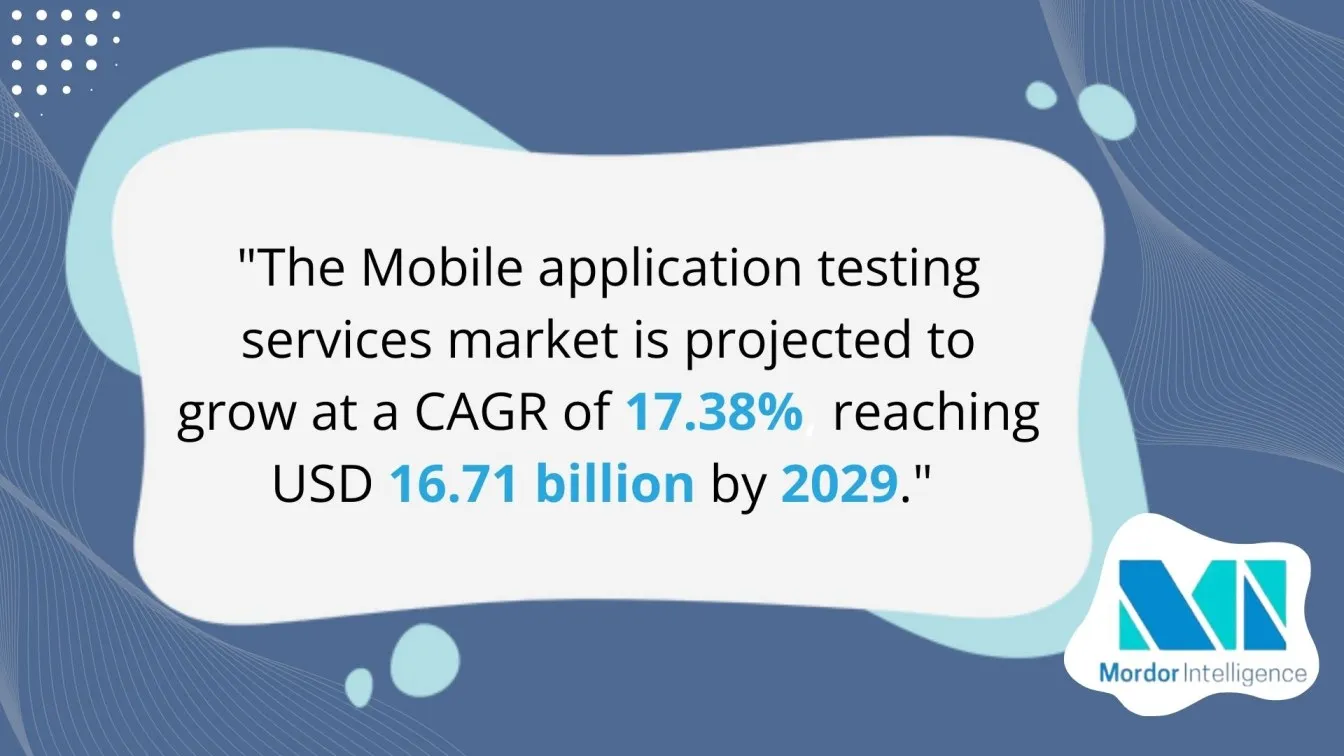
With the rise of AI for automation, testing has become even smarter. AI-driven automation can generate intelligent tests, predict bugs, and improve accuracy. This reduces manual effort and speeds up release cycles.
Appium mobile automation combined with AI is transforming testing by enhancing flexibility and precision. Ultimately, mobile test automation allows teams to deliver higher-quality apps in less time. 🚀
The Role of Appium in Mobile Test Automation
Appium is a key player in mobile test automation, enabling automated testing for both Android and iOS apps using a single codebase. As an open-source tool, Appium supports multiple programming languages like Java, Python, and JavaScript, making it flexible for various testing environments. ⚙️
With Appium automation testing, you can test native and hybrid apps seamlessly. It integrates well with other frameworks like TestNG and JUnit, ensuring smooth test execution. ✅
Cross-platform compatibility is one of Appium's biggest advantages, allowing you to run tests on multiple devices without changing the test scripts. This helps reduce testing time and enhances efficiency in mobile app testing. ⏱️
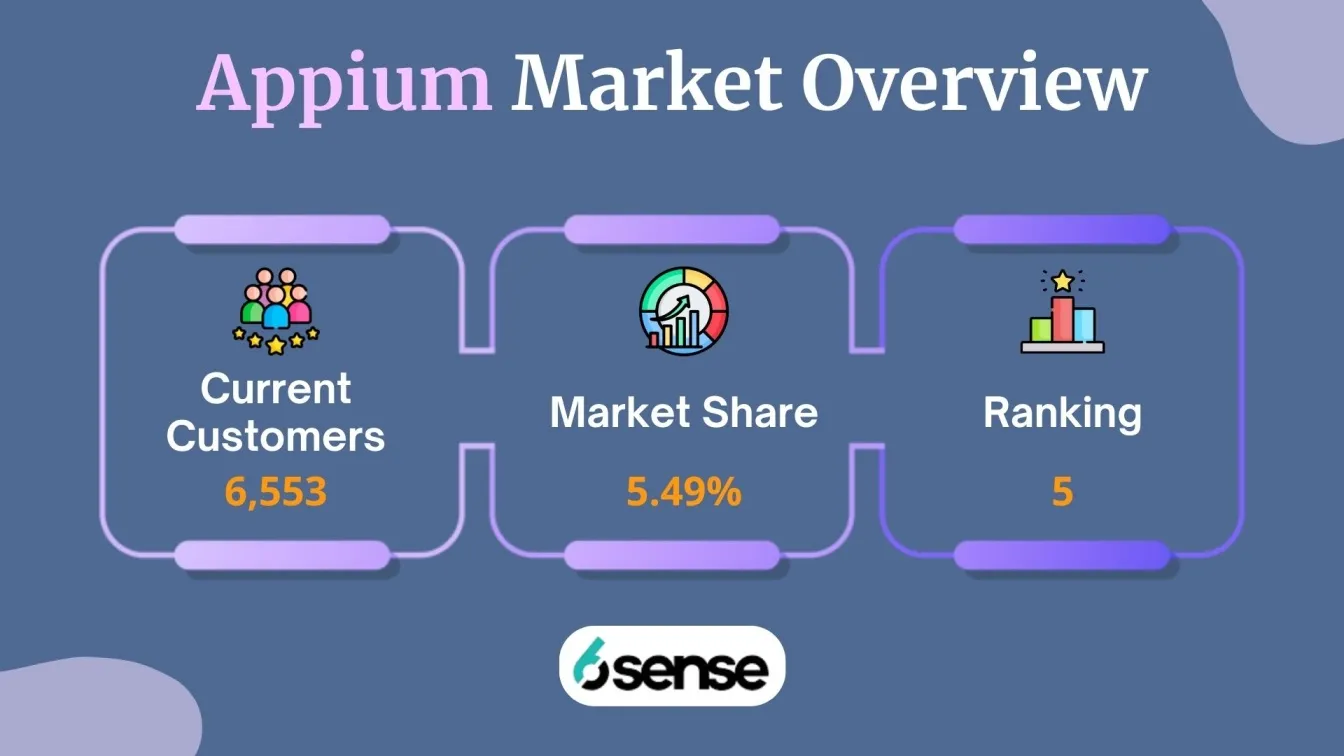
What is Appium?
Appium is an open-source mobile test automation tool designed for automating mobile applications on Android 📱 and iOS 🍏 platforms. It allows testers to write and run automated tests for both native apps (apps built for a specific platform) and hybrid apps (apps that combine native and web elements) 🌐.
Appium works by interacting with the mobile device through Appium servers and drivers, enabling the simulation of real user actions like tapping 👆, typing ⌨️, and swiping 👉. One of Appium's major advantages is its cross-platform compatibility, which allows you to write tests that work on both Android and iOS without modification.
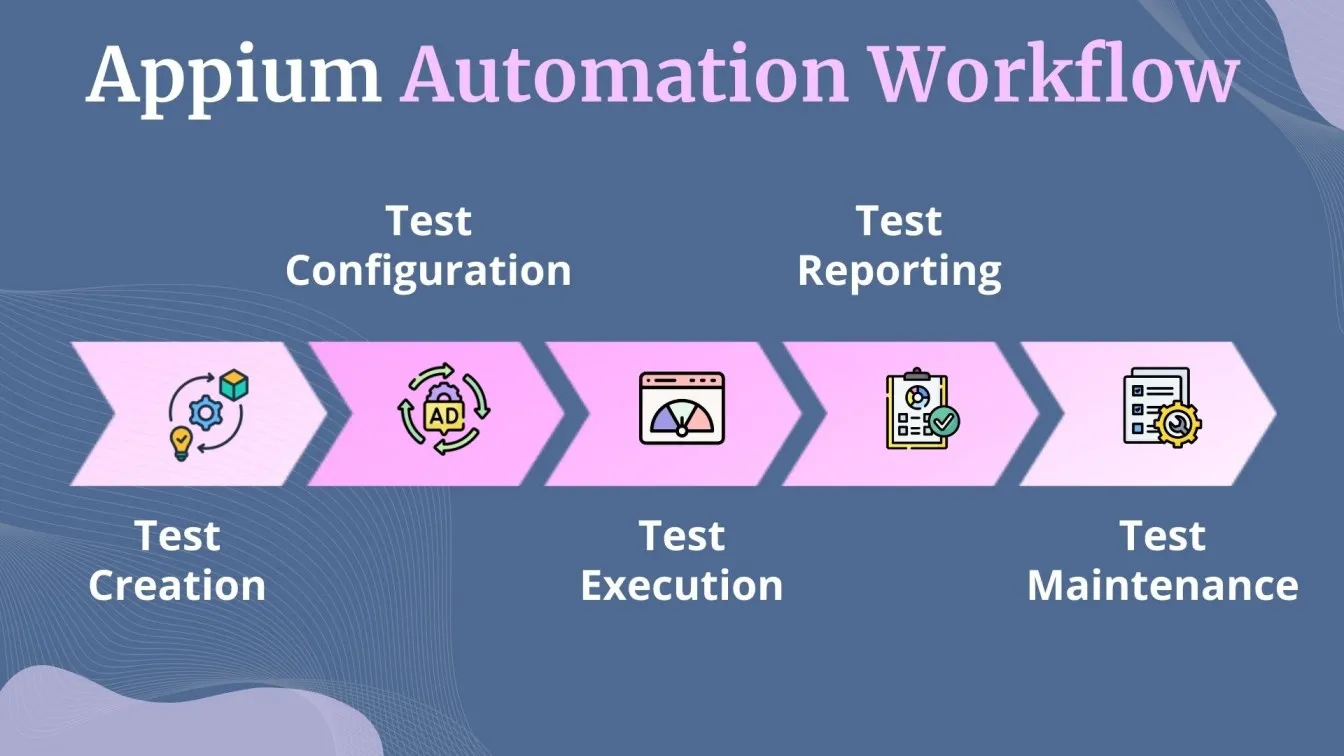
Key Features of Appium
Appium offers several powerful features that make it a preferred choice for mobile test automation. These features ensure that testers can automate mobile applications effectively, regardless of the platform, language, or type of app. Below are the key features of Appium that enhance its flexibility and compatibility across different mobile testing scenarios.
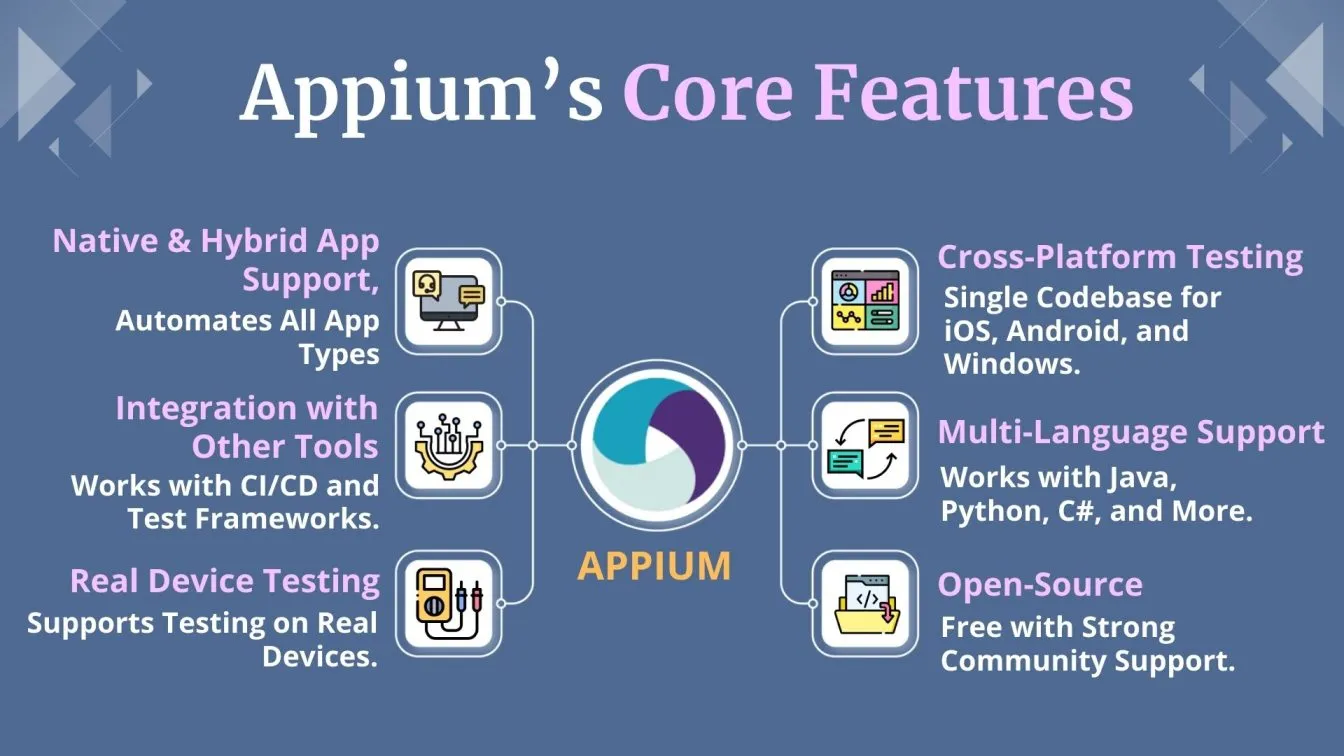
Understanding Appium as a Mobile Automation Framework
Appium is a powerful mobile automation framework that goes beyond simple test automation. It is built on a client-server architecture that uses drivers to communicate with mobile devices, allowing testers to automate mobile applications on both Android 📱 and iOS 🍏 platforms seamlessly.
As a framework, Appium offers several key features that make it stand out in mobile test automation. It supports cross-platform testing by enabling test scripts to be written once and run on both platforms without modification 🌍. This eliminates the need for platform-specific adjustments, making it cost-effective and time-efficient for teams.
Appium is also compatible with various automation frameworks and integrates with tools like JUnit and TestNG to enhance the testing process. It allows you to perform automation testing on real devices, simulators, and emulators to ensure comprehensive mobile app testing across a wide range of devices and screen sizes 📱.
This framework can be used for automating native, hybrid, and web apps on mobile devices, offering great flexibility for testers working in diverse environments and mobile app development cycles 🛠️.
.webp)
Importance of AI in Mobile Test Automation
AI is revolutionizing mobile test automation by making the testing process faster, smarter, and more efficient 🤖. Traditional testing often requires significant manual effort, but with AI-powered tools, mobile testing can be automated to detect issues in real-time and predict potential failures before they happen 💡. AI enables self-healing capabilities, which allow automation scripts to adapt to UI changes without needing manual updates 🔄.
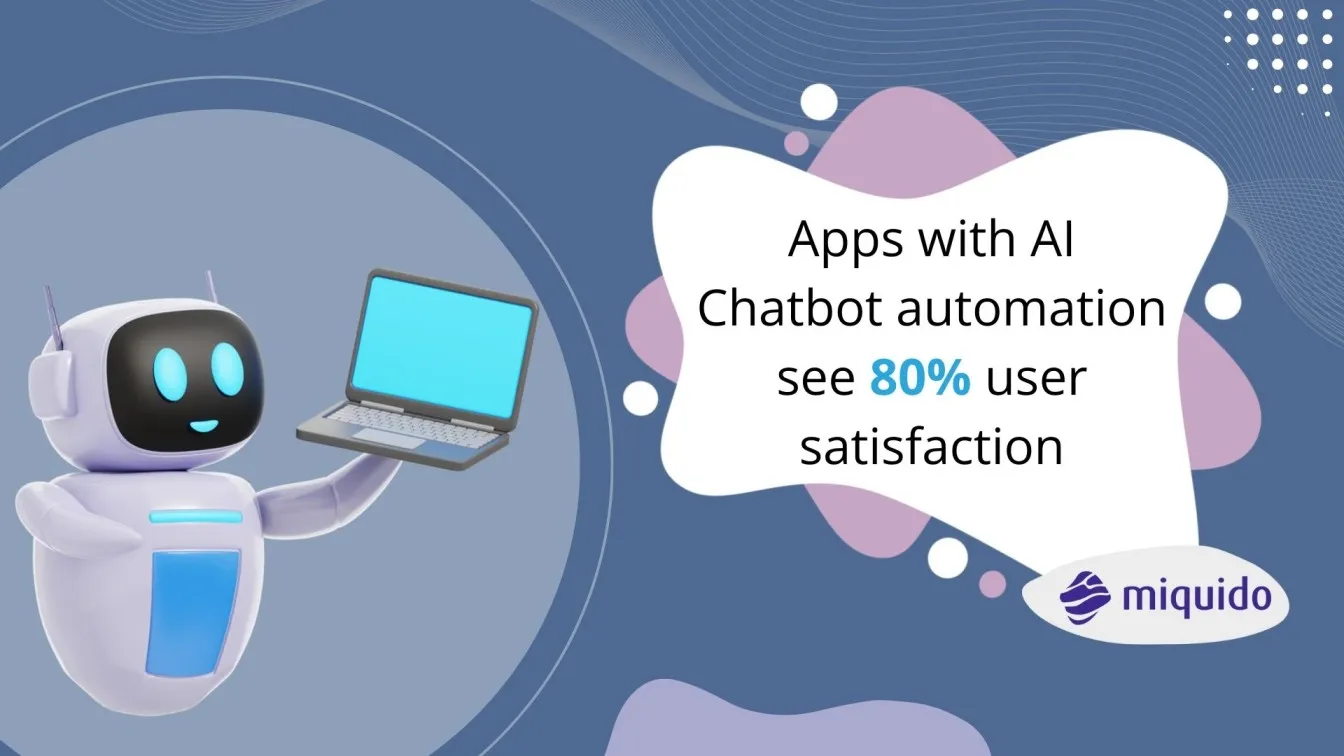
By integrating machine learning, AI can continuously improve test scripts, reducing human error and ensuring high-quality mobile applications across a wide range of devices. Visual testing powered by AI helps ensure that user interfaces (UI) appear as intended across various screen sizes and resolutions 🖥️📱. AI automation also accelerates testing in parallel, enhancing test coverage and shortening testing time ⏱️.
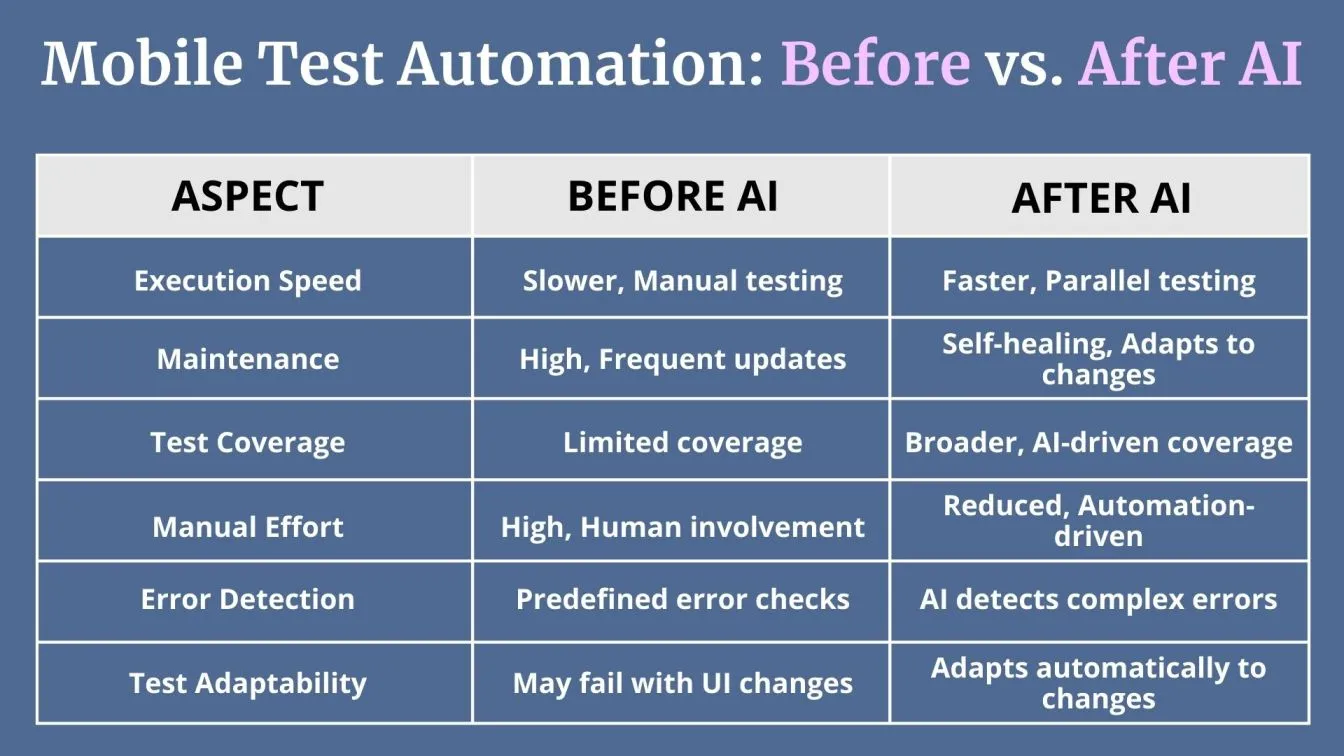
Getting Started with AI in Appium Automation
To get started with integrating AI in Appium automation, follow these steps:
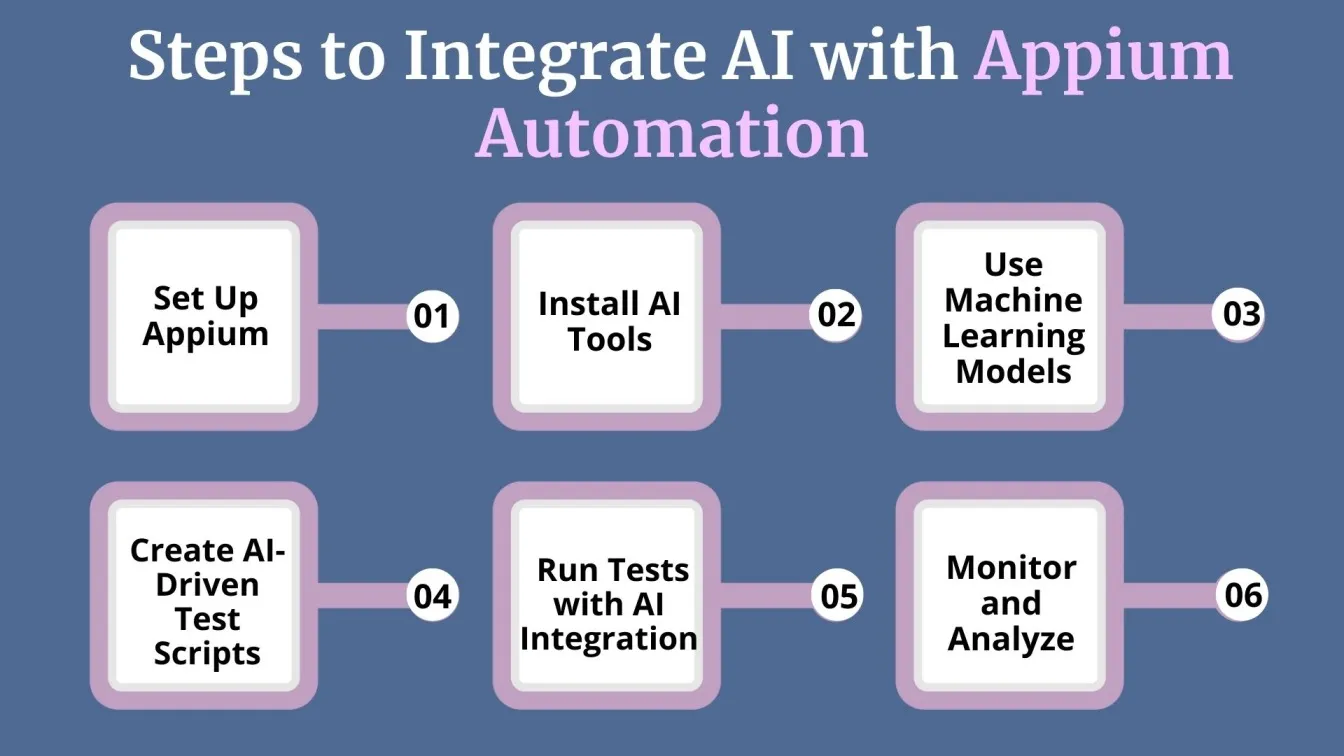
- Set Up Appium: Install Appium Server on your system and configure it for both Android and iOS platforms. Ensure you have the necessary drivers for both platforms.
- Install AI Tools: Choose and integrate AI-powered tools 🧠 like AI-based test optimizers or self-healing capabilities to enhance your tests.
- Use Machine Learning Models: Leverage machine learning models to analyze your test data for predictive analytics, improving test execution and detection of anomalies.
- Create AI-Driven Test Scripts: Write test scripts that incorporate AI capabilities, such as using image recognition for visual testing 👀 or automating decision-making processes based on past test results.
- Run Tests with AI Integration: Execute tests in parallel 🏃♀️ using AI's ability to optimize test execution time and identify high-risk areas for targeted testing.
- Monitor and Analyze: Continuously monitor the results using AI tools to provide intelligent feedback and recommendations for improvement in your mobile app test automation 🔍.
Benefits of Integrating AI with Appium
Integrating AI with Appium brings transformative advantages to mobile test automation. AI enhances efficiency, accuracy, and scalability while significantly reducing manual effort. With AI capabilities, testers can achieve faster test execution, improve coverage, and automatically adapt to changes in the app, ultimately leading to more reliable and robust mobile applications. Below are the key benefits of incorporating AI into your Appium automation workflow:
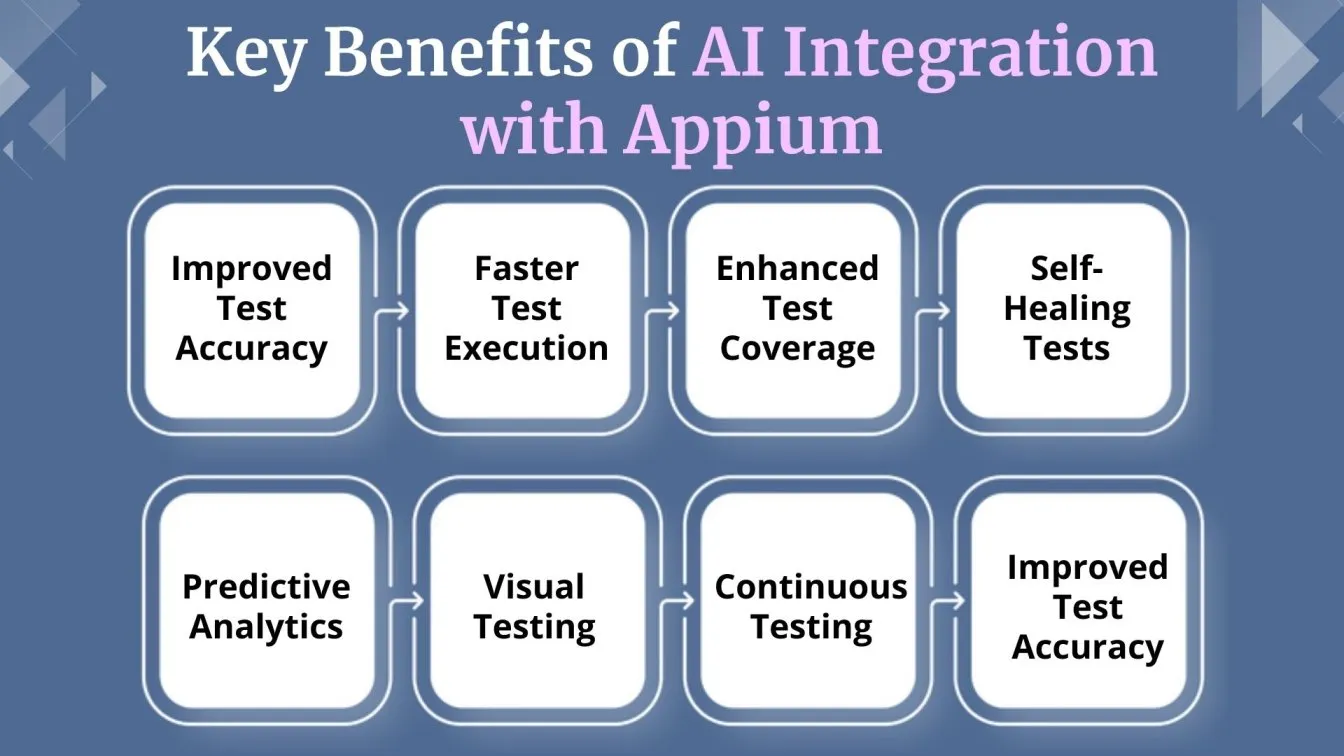
How AI Enhances Appium-based Test Automation
AI enhances Appium-based test automation by introducing intelligent features that make testing faster, more reliable, and adaptive. Below is a step-by-step process showing how AI gets involved in Appium-based test automation, from setup to test execution:
1. Setting Up Appium and AI Tools:
The first step is to install Appium on your system and configure it to work with Android and iOS devices. After setting up Appium, integrate AI tools to enhance the automation process. AI tools such as Testim, Applitools, or AI-based self-healing solutions are integrated into the test framework to bring in AI-driven capabilities.
2. Test Data Collection and Analysis:
AI can help in collecting and analyzing historical test data. By analyzing past results, AI models identify test scenarios that might require optimization or improvement. For instance, AI can predict the likelihood of failure based on data trends.
3. Automated Test Script Generation:
AI tools like Testim can automatically generate test scripts from natural language inputs or previous user interactions. The generated scripts can be used in Appium for cross-platform testing.
4. Self-Healing Tests:
One of the core benefits of integrating AI is the self-healing feature. When a test fails due to changes in the UI or app behavior (e.g., a button’s location changes), AI identifies the issue and fixes the script without requiring human intervention.
5. Parallel Test Execution & Test Optimization:
AI optimizes the test execution process by determining which tests to run and in what order, ensuring that tests are executed more efficiently. Additionally, AI can execute tests in parallel across multiple devices, reducing the overall testing time.
6. Continuous Monitoring and Real-time Analytics:
AI continuously monitors the tests in real time. It can identify issues such as performance degradation, failed tests, or anomalies, and provide feedback or recommendations on how to resolve them.
7. Reporting and Feedback:
After the test execution, AI tools generate detailed reports that include visual insights, test performance metrics, and potential issues with detailed recommendations for resolution.
Practical Use Cases of AI in Appium Automation
Below are some practical examples of how AI is used in Appium-based test automation. The following code snippets highlight real-life scenarios where AI tools are involved, from self-healing capabilities to automated script generation.
1. AI-Powered Self-Healing Test Scripts
When a UI element changes (e.g., a button's position), AI can detect this change and update the test script automatically.
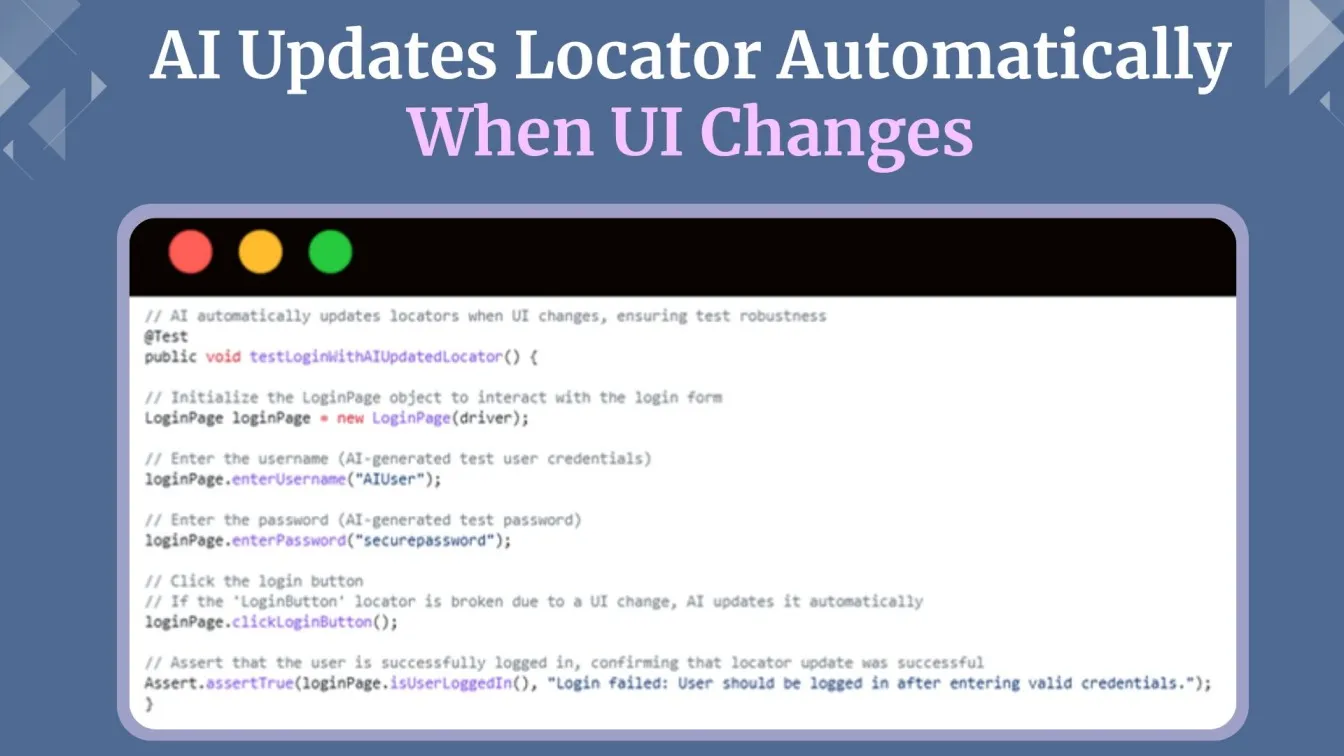
2. Automated Test Script Generation (Using AI tools like Testim)
AI tools like Testim generate test scripts based on natural language descriptions or by recording user interactions.

3. AI for Visual Testing (UI Regression Detection)
AI can detect visual regressions by comparing screenshots before and after an update, alerting testers about unexpected UI changes.
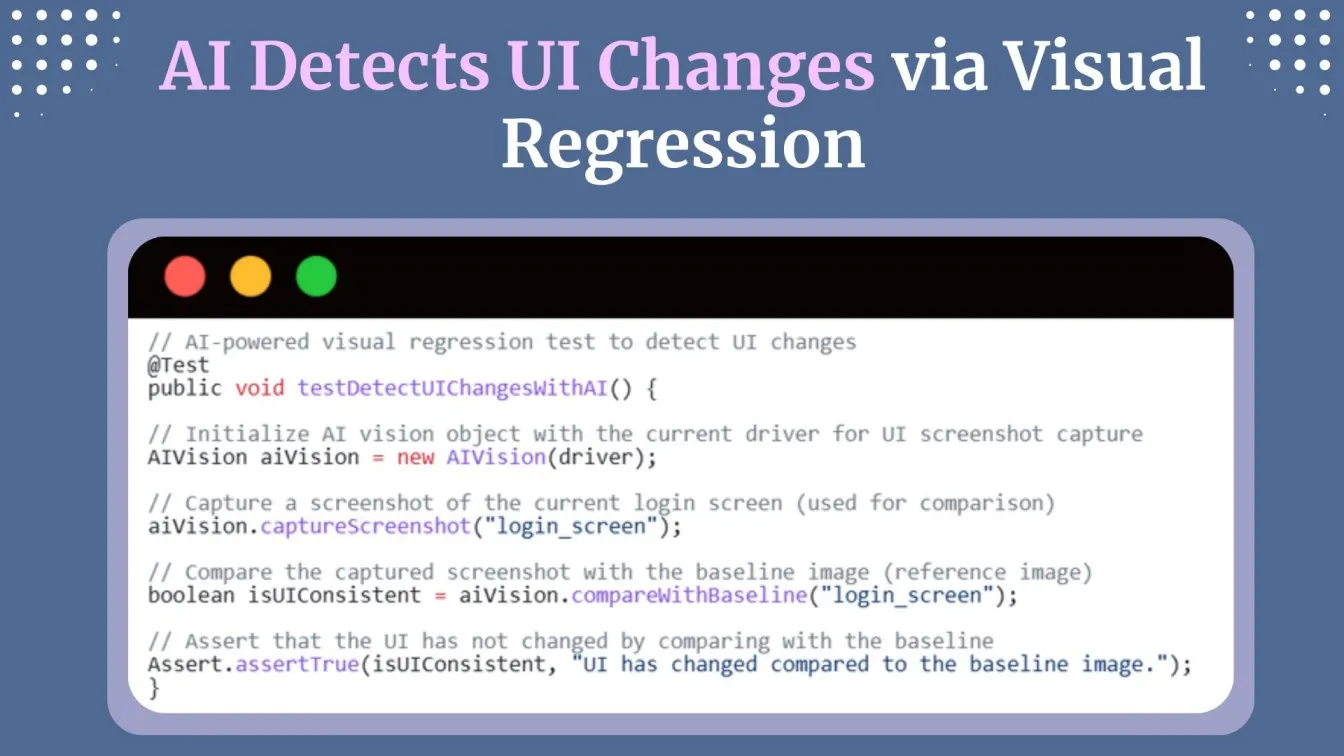
4. AI-Driven Performance Testing
AI can simulate thousands of users to check how well the app performs under heavy load and identify bottlenecks.
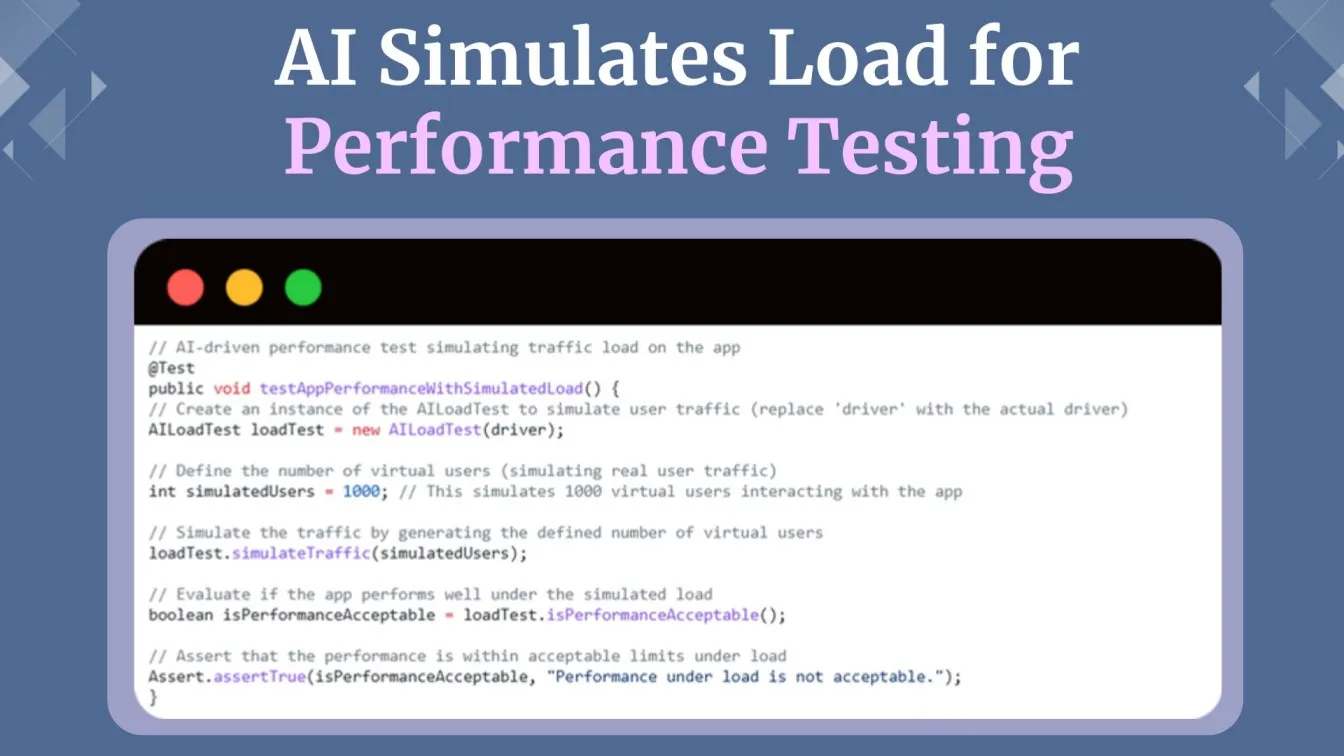
Best Practices for Integrating AI into Appium Test Automation
To successfully incorporate AI into Appium test automation, follow these best practices:
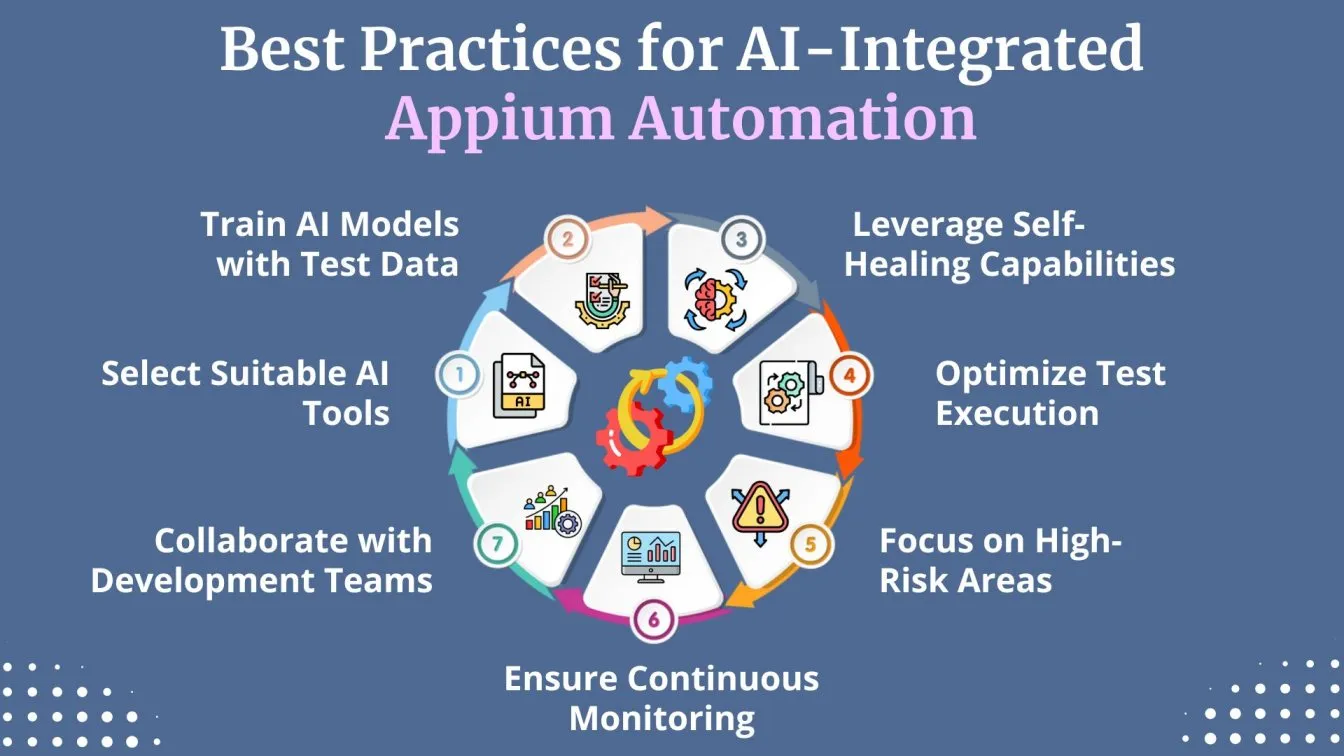
- Select Suitable AI Tools
Choose AI-driven tools that align with your testing goals, such as self-healing or predictive analytics. - Train AI Models with Test Data
Provide sufficient historical test data to machine learning models for accurate predictions and improved results. - Leverage Self-Healing Capabilities
Use AI tools that can dynamically repair broken test scripts, reducing maintenance efforts. - Optimize Test Execution
Implement AI to prioritize critical test cases, optimize parallel testing, and reduce execution time. - Focus on High-Risk Areas
Use AI analytics to target high-risk components of the application for thorough testing. - Ensure Continuous Monitoring
Continuously monitor test results and leverage AI tools for intelligent insights and reporting. - Collaborate with Development Teams
Integrate AI-driven insights into development processes to improve overall app quality.
Future Trends: AI and Appium in Mobile Test Automation
The future of mobile test automation will be driven by advancements in AI and Appium:
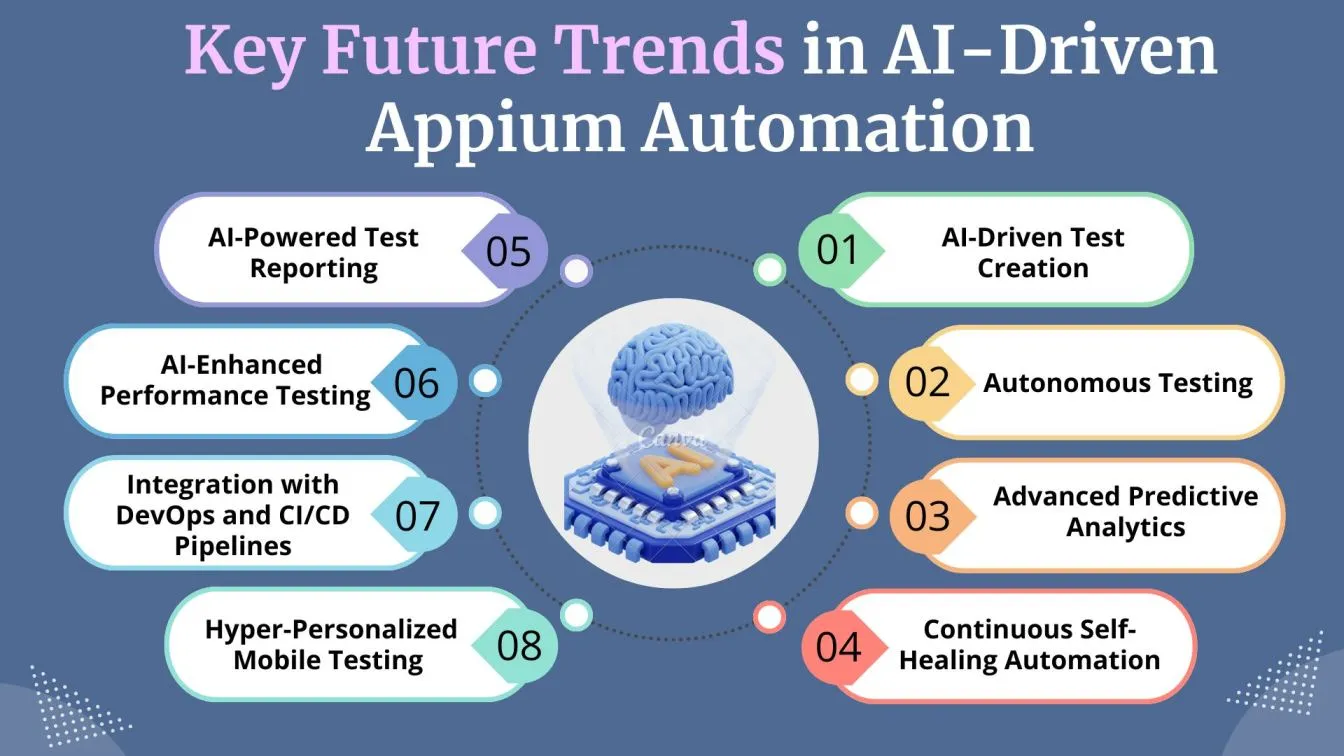
- AI-Driven Test Creation
AI will automate the creation of test scripts based on natural language instructions, further simplifying test authoring. - Autonomous Testing
AI-powered tools will enable fully autonomous testing, identifying test scenarios and executing them without human intervention. - Advanced Predictive Analytics
Enhanced AI models will predict test failures, application crashes, and performance issues with higher accuracy. - Continuous Self-Healing Automation
Self-healing capabilities will evolve, enabling AI to adapt to changes in the app UI and code seamlessly. - AI-Powered Test Reporting
Smart reporting tools will deliver actionable insights and recommendations for improving app quality. - AI-Enhanced Performance Testing
AI will analyze performance metrics to ensure applications deliver fast and reliable user experiences. - Integration with DevOps and CI/CD Pipelines
AI will integrate seamlessly with DevOps processes, enabling smarter, continuous testing during development cycles. - Hyper-Personalized Mobile Testing
AI will simulate real-world user behaviors, focusing on unique device configurations, screen sizes, and usage patterns.
Wrap-Up! ✨
AI is transforming mobile test automation with Appium by introducing intelligent features that enhance efficiency and accuracy. 🤖 From automating test creation to implementing self-healing capabilities, AI helps teams streamline their testing workflows. Tools like predictive analytics and real-time monitoring allow testers to quickly identify issues, prioritize tests, and improve the overall process.
With Appium's cross-platform testing, AI ensures seamless test execution across both Android and iOS devices, saving time and reducing manual intervention.
Looking ahead, AI will continue to advance mobile test automation by enabling autonomous testing and smarter reporting. 🚀 Self-healing features will adapt to changes in the app’s UI, while AI-driven performance testing will ensure that applications run smoothly across various configurations.
AI will integrate more closely with DevOps and CI/CD pipelines, accelerating release cycles and improving mobile app quality. The future of test automation will be faster, smarter, and more efficient with AI and Appium working together.
People Also Ask
👉How will AI impact Software testing?
AI enhances software testing by automating repetitive tasks, optimizing test coverage, and providing predictive analytics for faster and accurate testing.
👉What is the main advantage of using Appium on Sauce labs?
Appium on Sauce Labs enables cloud-based testing with access to a wide range of devices, allowing scalable, parallel, and cross-platform testing.
👉Can AI completely replace manual intervention in Appium testing?
No, AI cannot completely replace manual intervention in Appium testing. While AI can automate repetitive tasks such as script generation and test execution, human input is still required for complex scenarios, nuanced decision-making, and validation of test results.
👉Can Appium and Selenium work together?
Yes, Appium integrates with Selenium for automating web-based mobile applications, enabling unified mobile and cross-platform testing.
👉Can AI help with dynamic element identification in Appium?
Yes, AI uses self-healing, image recognition, and ML techniques to identify dynamic elements, improving script stability and reducing failures.



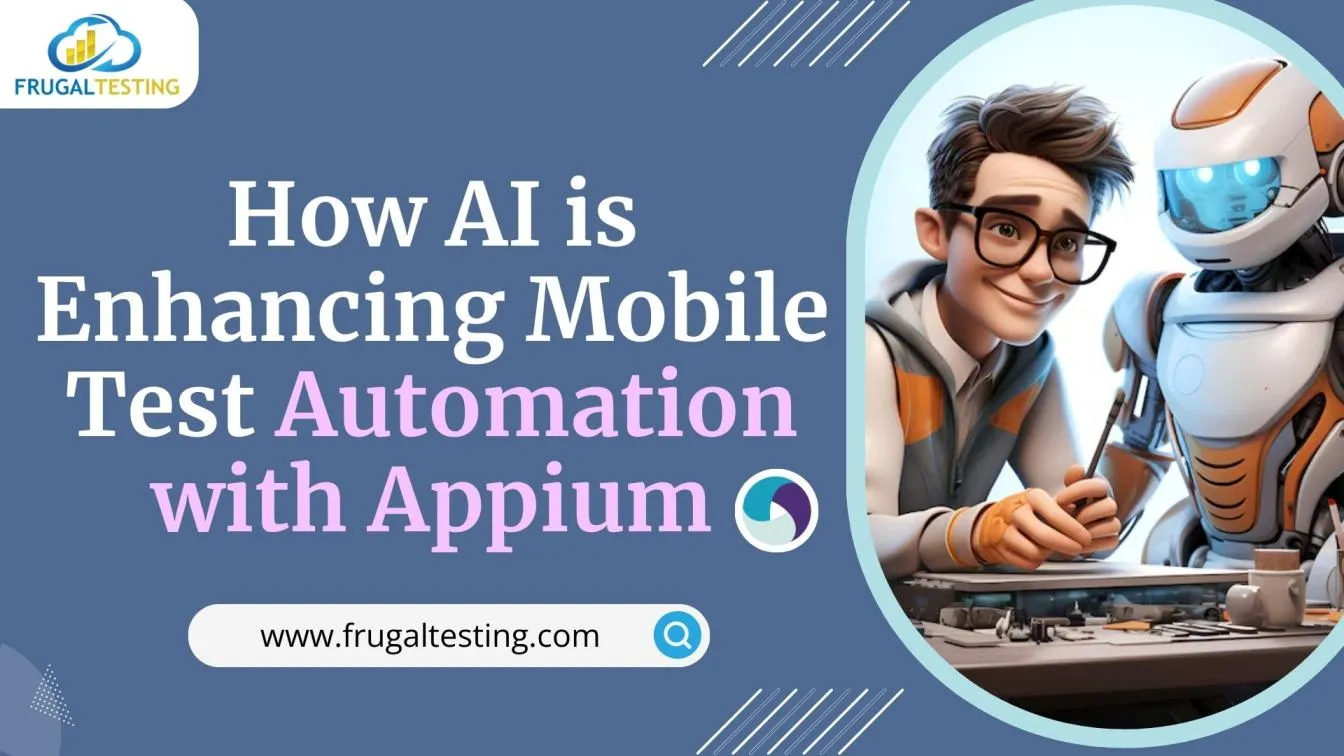

%201.webp)
